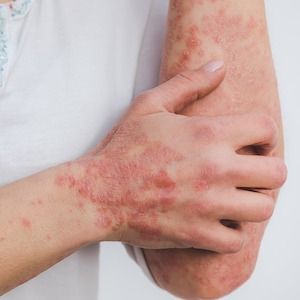News
Article
Study Confirms Efficacy of Guselkumab Treatment of Psoriasis After Ustekinumab Discontinuation
Author(s):
These multicenter, retrospective data highlight the use of guselkumab after discontinuing ustekinumab treatment up to 156 weeks of use.

Guselkumab is a safe and effective treatment of plaque psoriasis following up to 156 weeks of ustekinumab and subsequent discontinuation, according to recent findings, though additional research may be necessary to confirm these conclusions.1
This research—led by Matteo Megna of the department of clinical medicine and surgery at the University of Naples Federico II in Italy—was conducted to assess the efficacy and safety of treating psoriasis patients with guselkumab. Specifically, Megna et al. evaluated individuals who had not responded to ustekinumab for up to 3 years.
While the NAVIGATE trial had assessed guselkumab’s use among patients with moderate-to-severe psoriasis and an inadequate ustekinumab response, these data were noted by the investigators as necessitating real-life confirmation.2
“Real-world data are highly needed to confirm trial data in a more complicated setting and also because guselkumab and ustekinumab partially share their therapeutic target (the p19 subunit of IL23 vs. the p40 subunit of IL12 and IL23), as well as the frequency of subcutaneous administration (8 vs. 12 weeks), indications (psoriasis and psoriatic arthritis), and a high safety profile,” Megna and colleagues wrote.1
Background and Methods
The investigators implemented a multicenter retrospective trial design and their research was conducted by evaluating individuals with moderate-to-severe plaque psoriasis who also had been given guselkumab treatment at 9 different centers located within Italy’s Campania region.1
The research team looked at data such as participants’ history and their duration of psoriatic arthritis if shown to be present, their demographic details, reported comorbidities, and clinical characteristics (duration of psoriasis, impacted body regions such as soles, palms, nails, scalp, and genital area). The team also evaluated data regarding details of subjects’ prior and current systemic psoriasis medications, focusing on ustekinumab utilization duration and rationale for cessation.
The investigators looked at Psoriasis Activity Severity Index (PASI) and Dermatology Life Quality Index (DLQI) scores at the point of baseline to assess subjects’ disease severity, assessing both at each follow-up interaction at the 16, 36, 52, 104, and 156-week marks. The team also looked at subjects’ treatment-emergent adverse events (AEs) through the use of physical evaluations as well as laboratory testing.
The subjects included in the team’s work were required to have been treated with guselkumab for 16 weeks at minimum, received a dermatologist-confirmed diagnosis of psoriasis, and had previously reported an experience of either primary or secondary failure in using ustekinumab. Subjects were also required to have switched from ustekinumab and directly to guselkumab to take part in the study.
Criteria for research exclusion were being under 18 years old and having had forms of psoriasis other than plaque psoriasis.
The investigators administered guselkumab in a manner based upon the dosage that had been prescribed for psoriasis, specifically with 100 mg given to patients subcutaneously at the 0 and 4-week marks, and then every 8 weeks. Data related to efficacy were evaluated through the use of the last observation carried forward method.
Findings
Overall there were a total of 112 individuals—with 62.5% being male and an average age of 54.8 ± 11.7 years—who took part in the research team’s study. It was noted that 42.9% of these 112 individuals finished a single year, 30.4% finished 2 years, and 14.3% finished 3 years of follow-up while being treated with guselkumab.
There were several substantial clinical improvements reported by the team beginning in the sixteenth week. The investigators noted that efficacy was shown to be sustained at each of the checkpoints up to the 156-week mark.
The investigators also found that no serious adverse events (AEs) had been identified within their research. Their sub-analysis also demonstrated that subjects that had psoriatic arthritis or palmoplantar psoriasis were found to have less clinical improvement at the 16 and 36-week points, although there were no observed distinctions by Week 52.
The medication’s effectiveness, in contrast, was not shown by the research team to have been impacted by nail involvement, body mass index (BMI), or impacted regions within the genital or scalp areas of patients’ bodies.
“To the best of our knowledge, our study was the longest (156 weeks) real-life experience investigating the effectiveness of guselkumab following ustekinumab discontinuation,” they wrote. “Despite its limitations and retrospective design, our data showed that switching from ustekinumab to guselkumab does not affect the effectiveness of the anti-IL 23.”
The team noted that their research’s retrospective nature, their somewhat smaller cohort size, and the team’s limited subject numbers who had been given 3 years of follow-up were all listed as potential limitations of the study’s generalizability.
References
- Megna M, Balato A, Lembo S, et al. Real-Life Effectiveness and Safety of Guselkumab in Patients with Psoriasis Who Have an Inadequate Response to Ustekinumab: A 3-Year Multicenter Study. J Clin Med. 2024 Apr 26;13(9):2552. doi: 10.3390/jcm13092552. PMID: 38731081; PMCID: PMC11084800.
- Cinelli E, Fabbrocini G, Megna M. Real-world experience versus clinical trials: Pros and cons in psoriasis therapy evaluation. Int. J. Dermatol. 2022;61:e107–e108. doi: 10.1111/ijd.15644.





